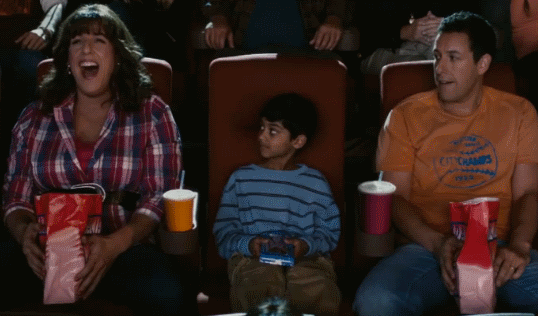Some Thoughts On 'Jack and Jill'

1. Let’s dispense with the obvious: Jack and Jill is a vehicle for Adam Sandler, who plays both titular roles. The concept that Sandler is playing his own twin sister is, of course, the hook here to draw audiences, as well it should be: Sandler is one of our most under-appreciated performers, comedic or otherwise, and it’s been obvious since his debut as the lead in Billy Madison, where he actually made you feel his transformation from lazy, spoiled hotel-empire heir into energetic scholar who finally realizes the importance of actually believing in something. But Jack and Jill is about much more than a talented thespian at the height of his powers. It’s a meditation on identity.
2. The film opens with LA ad executive Jack Sadelstein dreading the arrival of his twin sister Jill for her annual Thanksgiving visit. While the pair were once quite close, Jack now finds Jill difficult to take. Once Jill shows up, hijinks, as is their wont, ensue. There is a series of crude if effective gags, and the humor is on the level that one generally expects from a Sandler film. But this time the comedy is more subversive. One gets the sense that Sandler and director Dennis Dugan are using farce to mask the more serious points they want to get across about who we are and how we define ourselves in a stark and uncaring world.
3. The fact that Jack and Jill are twins speaks directly to the dualities inherent in all of us. Sandler and Dugan want us to consider who we are on the most basic existential level, what we show and what we hide as we make our way through life. The very traits that Jack finds so irksome in Jill are, of course, extensions of his own nature, jagged reminders of what he’s repressed as he has chased success in his chosen field and attempted to create the perfect family life. (In an interesting bit of casting, Katie Holmes, whose own domestic relationship has been the subject of much analysis concerning public face v. private motivation, plays his wife.)
4. Even more transgressively, Jack and Jill are twins of different genders. What Sandler and Dugan are doing here is, to my mind, the most audacious attempt to encourage discussion about the fluidity of sexual classification in a major studio comedy since 2000’s challenging — if worryingly heteronormative — What Women Want. In an era where the dominance of the patriarchy is widely assumed to be in its twilight, Jill, and her contentious relationship with Jack, represents the anxieties many men are feeling when they think about the future. The fact that much is made of Jill’s unattractiveness is a knowing nod of the part of the producers to the barely concealed disgust with which men are confronting their increasing lack of relevance.
5. To make matters even more complex, Sandler and Dugan have convinced Al Pacino to portray Al Pacino, or at least a cinematic version of Al Pacino. The sheer genius of this exploration of mimesis in a film that is already concerned with the concept of individuality may be the movie’s most triumphant stroke: To have an actor who is so frequently accused of playing himself actually playing himself as an addled version of Al Pacino — one who falls for the feminine side of the lead character’s struggle in duality — could easily have been a step too far, but the depth of thought that Sandler’s creative team has put into the whole project makes the whole thing work on an entirely new plane of personal exploration.
6. Also there is a cameo by Johnny Depp. You should totally see this movie.
Jack and Jill, directed by Dennis Dugan, opens tomorrow. The running time is 90 minutes.
